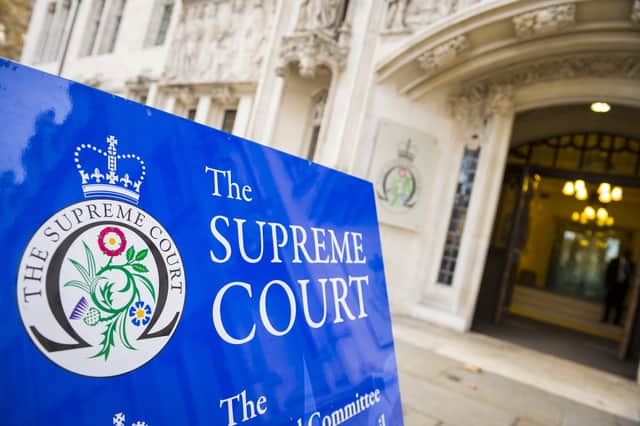Lloyd v Google: Supreme Court ruling - is Google set to pay UK iPhone users £750 each in compensation?
This article contains affiliate links. We may earn a small commission on items purchased through this article, but that does not affect our editorial judgement.


The Supreme Court has today thrown out a case which could have seen Google pay each UK iPhone owner £750 in compensation.
The case was brought forward by consumer expert Richard Lloyd over claims of alleged data harvesting by the company between 2011 and 2012.
Advertisement
Hide AdAdvertisement
Hide AdHaving initially had the case rejected by the High Court, three Court of Appeal judges overturned the decision prompting Google to challenge at the Supreme Court.
Here’s all you need to know about Lloyd v Google.
Why is Richard Lloyd attempting to sue Google?
Richard Lloyd, the former Which? director, launched a billion pound legal action against Google in 2018 over claims it secretly tracked millions of iPhone users’ internet activity.
The claims, supported by campaign group Google You Owe Us, detailed how the company had collected user information via the iPhone’s Safari browser, known as the ‘Safari workaround’.
It was alleged that around 4.4 million people in England and Wales were subjected to the secret tracking of user information which divided people into categories for advertisers.
Advertisement
Hide AdAdvertisement
Hide AdThey say “browser-generated information” collected by Google included racial or ethnic origin, physical and mental health, political affiliations or opinions, sexual interests and social class.
Google’s lawyers say there is no suggestion the so-called ‘Safari workaround’ resulted in any information being disclosed to third parties. The Supreme Court blocked the case.
How much was Richard Lloyd claiming from Google?
Richard Lloyd and Google You Owe Us were claiming up to £3.2 billion from the US tech firm Google for alleged breaches of the Data Protection Act.
That could have seen each UK individual who owned and used an iPhone between August 2011 and February 2012 handed £750 in compensation in a US style class action lawsuit.
Advertisement
Hide AdAdvertisement
Hide AdA verdict arrived quickly on the morning of Wednesday 10 November in which the Supreme Court ruled the class action could not succeed as it could not be proved that "any facts particular to any individual iPhone users".
It was also said that the claim was not "alleging or proving that Google’s alleged unlawful conduct caused any financial damage or mental distress to any such individual".
It follows a turbulent three years which at first saw the case thrown out by the High Court after a judge said it was difficult to calculate how many people had been impacted by the claim.
Mr Lloyd and Google You Owe Us then challenged this decision at the Court of Appeal in 2019 at a hearing in which three judges determined the legal action could go ahead.
Advertisement
Hide AdAdvertisement
Hide AdGoogle lodged an appeal, arguing the ruling could "open the floodgates" to widespread claims brought on behalf of people against companies responsible for handling data.
What does the Supreme Court ruling mean?
The Supreme Court ruling is bound to have a ripple effect on how the collection and use of data by businesses will be viewed.
Media law expert Steve Kuncewicz, Partner and Head of Creative, Digital & Marketing, discusses the implications for consumers and businesses alike.
Mr Kuncewicz said: “Today’s outcome will be a sigh of relief for Google, and any organisation that handles significant amounts of data or bases its business model on the use of personal data. Even those that don’t may also have reason to celebrate.
Advertisement
Hide AdAdvertisement
Hide Ad“Had the Supreme Court upheld the Court of Appeal’s initial judgement we could, regardless of how hard the last judgement worked to try and discourage it, have faced a situation where effectively every data breach could lead to a court claim without any proof of distress or actual damage, and no matter how minor the breach. It could have been ruinous for data controllers up and down the country, who may have found themselves on the receiving end of US-style ‘opt-out’ class actions in the event of a breach.
“As it stands, this decision has sought to try and put the data genie back in its bottle insofar as that’s possible, although it won’t necessarily discourage claimant law firms from continuing to pursue data breach claims more generally. It may, however, give defendants more ammunition to resist them.
“Consumers are, reasonably, becoming more aware of their personal data rights, and there’s therefore little reason that a business shouldn’t be just as educated. Organisations, of any size, must take every step to protect customer data, and therefore protect their bottom line against potential data breach claims.”
A message from the editor:
Thank you for reading. NationalWorld is a new national news brand, produced by a team of journalists, editors, video producers and designers who live and work across the UK. Find out more about who’s who in the team, and our editorial values. We want to start a community among our readers, so please follow us on Facebook, Twitter and Instagram, and keep the conversation going. You can also sign up to our email newsletters and get a curated selection of our best reads to your inbox every day.
Comment Guidelines
National World encourages reader discussion on our stories. User feedback, insights and back-and-forth exchanges add a rich layer of context to reporting. Please review our Community Guidelines before commenting.
